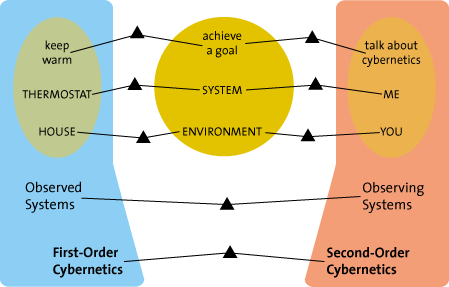Cybernetics Classes
Stanford University 2001—2007

| The Domain of Cybernetics — Cybernetics may be defined as the science
of describing goal-directed systems. The term comes from the
Greek word "kubernetes", meaning "steersmanship."
(From the same Greek word but through Latin, English gets the
word "governor.") In general (center of diagram), cybernetics
is useful in understanding a goal-directed system that exists
in an environment which, because it is dynamic, makes an unchanging
set of actions by the system inadequate to achieve the system's
goal. Initially (left side of diagram) cybernetics was concerned
with systems that were observed (such as thermostats). It soon
became clear that one could also observe systems that were themselves
observing (right side of diagram). This brought issues of language,
meaning and subjectivity into sharp focus. |
|
Introduction to Cybernetics and Systems for Design. Autumn 2002 through 2007—Hugh Dubberly and Paul Pangaro
This class focused on the similarities between the framework
of cybernetics and the processes of design, and how cybernetics
provides tools for the design of complex systems, whether purely
mechanical (such as product and software design) or collaborative
(such as organizational and process design). See also online class description and syllabus.
Introduction to Cybernetics, An Humane Approach to Computing.
Autumn 2001—Paul Pangaro
This class focused on the differentiation of modeling based
on a cybernetic framework and involved the students by requiring
assignments to model the concepts in the readings. Authors read
include McCulloch, Pask, von Foerster, Maturana. Videos of some lectures are available online.
On-Line References
Materials on cybernetics are only slowly being made available
on-line, and these limited references cannot reflect the depth
and breadth of the field. And, as in any field with many contributors,
not everything under the name of cybernetics is consistent, and
some sites may give a confusing impression of cybernetics.
General
Wikipedia has a growing body of useful links on cybernetics, while not all are authoritative or on-point.
Heinz von Foerster
There are many "giants" of cybernetics, but none
so crystal-clear in thinking and writing as Heinz von Foerster.
Gordon Pask
Eccentric beyond description and 30 years before his time,
Gordon Pask has influenced generations of innovators, including
Ted Nelson and Nicholas Negroponte (to name the most well-known
figures). Unfortunately very little of Pask's own writing is
on-line.
- Comprehensive list of links about Pask
- Videos of lecture and Colloquy of Mobiles from ICA Installation of Cybernetic Serendipity
- "A comment on the cybernetic psychology of pleasure" is from the 1960s
and only introduces concepts that are developed further elsewhere
(see the first Off-Line
reference, below). Beware an apparent mislabeling of the
2nd numbered list, which should be "a, b, c and d" instead of "1, 2, 3
and 4."
Personal Links
These links are from pangaro.com:
- A definition
of cybernetics
- An application of cybernetics to customer relationships and organizational design
- A summary of software
implementations and approaches to user interface design
The remainder of these links are included on the summary page
just mentioned:
Off-Line References
This paper describes in detail an interaction environment
where the user playing
a musical instrument is engaged in a conversation with a mechanism
that focuses the user's attention, gets bored, and otherwise
stimulates the user in novel and unexpected ways. It is a fabulous
proposal for a type of video game, though Pask built the original
version of this system in the 1950s and carted it around England
in vans for installation in music halls.
- Gordon Pask: "A Comment, a Case
History and a Plan". In Cybernetic Serendipity, edited
by J. Reichardt. Rapp and Carroll, 1970. Reprinted in Cybernetic
Art and Ideas, edited by J. Reichardt. London: Studio Vista,
1971, 76-99.
Special thanks to Hugh Dubberly.
|
